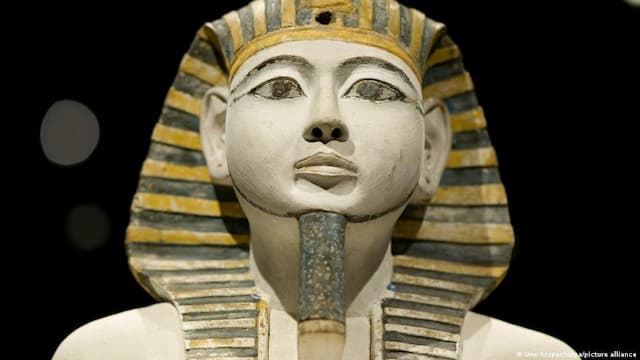Why the gospel calls for faith (Romans 1:17)

We live because God does right out of his faithfulness to us. So, faithfulness to God leads us to do right as we live.
The opening verses of Paul’s letter to Rome contain the message the whole letter unpacks. By verse 17, the key theme comes into view:
Romans 1:17 (ESV)
For in it the righteousness of God is revealed from faith for faith, as it is written, “The righteous shall live by faith.”
Questions? What is the righteousness of God? How is it revealed in the gospel? What does from faith for faith mean? And why include a quotation when he’s packing the message so densely?
Watching Paul launch this letter feels like watching the launch of the James Webb Space Telescope on Christmas Day 2021. Four instruments and 18 mirrors were crammed into a tight bundle atop an Ariane 5 rocket. Minutes after countdown, it was soaring above the atmosphere, unfolding its payload faster than anticipated because the trajectory was so good. Then it took months to reach its orbital position and focus the mirrors before we could start to see what it was designed to show us.
Romans 1:17 is so tightly packed that different people unpack it different ways, depending on the assumptions we bring to the text. Good commentators look for how Paul himself unpacks this theme in the rest of the letter. The Habakkuk quotation tells us to look backward as well as forward.
I don’t believe Paul was prooftexting, lifting some phrase out of context to validate his message. Read the quote in context and you’ll see Habakkuk discussing how relationship with God works: doing right, out of faithfulness.
Connecting faith and righteousness
Habakkuk asks why God lets his people get away with murder: Why do you idly look at wrong? (Habakkuk 1:3). God was willing to act: “I’m raising up the Babylonians to take the land” (1:6). Habakkuk doesn’t doubt they deserve it, but he can’t see how this is doing right if God is meant to be faithful to them (1:12–2:1).
God agrees that Babylon’s power cravings are not right (2:4a), mercilessly killing nations forever as Habakkuk put it (1:17). God explains that his covenant nation will not die out, despite Babylon’s deadly intentions: those who do right out of faithfulness will live (2:4).
600 years after this conversation between God and Habakkuk, Babylon was long gone, overpowered by Persia. Persia was long gone, overpowered by Greece. Greece was long gone, overpowered by Rome. But God’s nation lived on, in limbo. Their continued existence was living evidence that God was doing right by his people because of his covenant faithfulness to them. And God had called them to live like that: to do right out of their covenant faithfulness to him.
The gospel
At the hinge of history, we see the revelation of God doing right out of faithfulness.
Out of his faithfulness, God sent his people the king he had promised: his Son, the Messiah. But those who wanted power for themselves (those whose desires were not right) handed him over to their enemies. The assassination of God’s Messiah was the worst rebellion against God’s sovereignty in history.
But instead of acting out of vengeance against his enemies, God acted out of faithfulness when he raised Jesus from the dead. That’s God doing right because of his faithfulness: his sovereign faithfulness to the world that crucified his Son, his faithfulness to the covenant people who handed him over, his faithfulness to the Son who had done right by entrusting his life to his Father.
The resurrection of the Christ is the revelation of God’s righteousness — our heavenly sovereign doing right out of his faithfulness to the world in his care.
We’re missing the point if we think the gospel is a story about how I get to be considered righteous. It’s a story about God acting rightly by raising up his Son, proclaiming him Lord, restoring us into his governance instead of domination by death (1:1-4).
That’s what it means to say, In the gospel the righteousness of God is revealed (1:17, NIV).
The response God calls for
God does right by us, out of his loyalty to us. And that’s how he calls us to live: doing right out of loyalty to God.
- That was God’s promise to exiled Israel: the righteous person will live by his faithfulness (Habakkuk 2:4).
- That’s how the Messiah fulfilled all righteousness for his people: the righteous person was living out of faithfulness to his Father.
- That’s the response God calls all the nations to give in response to his gospel announcement that he has raised up his Son as Lord of all: calling all the nations into the obedience that comes from faith (1:5).
That last phrase is identical in meaning to the quote from Habakkuk. To say that the gospel calls us into obedience from faith (εἰς ὑπακοὴν πίστεως, verse 5) is to say that the righteous will live out of loyalty to God’s Messiah (δίκαιος ἐκ πίστεως ζήσεται, verse 17).
From faith, to faith
The relationship between God and humanity depends on loyalty to each other:
- God does right out of his loyalty to us, with the resurrection and enthronement of his Son as evidence.
- God calls us to do right out of loyalty to him, into obedience from faith (verse 5), so the righteous are living out of faithfulness to him (verse 17).
The entire divine rescue mission comes out of God’s faithful commitment to us, and into our faithful commitment to him. That’s the heart of verse 17: out of faith(fulness), into faith(fulness) (ἐκ πίστεως εἰς πίστιν).
Romans 1:17 in context
This is how the covenant relationship works:
- As our sovereign, God does right out of faithfulness to us.
- As his people, we do right out of faithfulness to him.
In light of the preceding verses and the Habakkuk quotation, this is what verse 17 says:
How God does right finally comes becomes clear in his good news proclamation [of Christ as Lord]. Out of his loyalty to us, we’re led into loyalty to him — just as Scripture says, ‘Those who do right out of loyalty will live.’
I think that makes more consistent sense than treating “righteousness” as a commodity God has but we lack, so the only way to balance his justice scales would be for God to give us some of his.
What others are saying
James D. G. Dunn, Romans 1–8, WBC (Dallas: Word, 1988), 40–41:
Righteousness is not something which an individual has on his or her own, independently of anyone else; it is something which one has precisely in one’s relationships as a social being. … God is “righteous” when he fulfills the obligations he took upon himself to be Israel’s God, that is, to rescue Israel and punish Israel’s enemies (e.g., Exod 9:27; 1 Sam 12:7; Dan 9:16; Mic 6:5) — “righteousness” as “covenant faithfulness” (3:3–5, 25; 10:3; also 9:6 and 15:8). Particularly in the Psalms and Second Isaiah the logic of covenant grace is followed through with the result that righteousness and salvation become virtually synonymous: the righteousness of God as God’s act to restore his own and to sustain them within the covenant. …It is clearly this concept of God’s righteousness which Paul takes over here; the “righteousness of God” being his way of explicating “the power of God for salvation.” … It is with this sense that the phrase provides a key to his exposition in Romans 3:5, 21–22, 25–26; 10:3), as elsewhere in his theology (2 Cor 5:21; Phil 3:9).
Douglas J. Moo, The Letter to the Romans, NICNT (Grand Rapids, MI: Eerdmans, 2018), 100.
For Luther and many Protestant interpreters who have followed him, “justification by faith” is the center of Romans, of Paul’s theology, and indeed of the Bible. This view of the matter has, however, been subjected to severe criticism. … Justification by faith is the anthropological reflex of Paul’s basic conviction that what God has done in Christ for sinful human beings is entirely a matter of grace (see especially 3:24; 4:1–8, 16).
Michael F. Bird, Romans, The Story of God Bible Commentary (Grand Rapids, MI: Zondervan, 2016), 43:
The righteousness of God signifies the fidelity and justice of God’s character, the demonstration of his character as the judge of all the earth, and his faithfulness toward Israel in Jesus Christ. The righteousness of God, then, is the character of God embodied and enacted in his saving actions.
Related posts
- The gospel in Romans
- Romans: opening and closing theme
- What does it mean to believe?
- Where’s your allegiance? (Mt 10:32-33)
- What is faith? (podcast) (Mt 8:5-13)
Seeking to understand Jesus in the terms he chose to describe himself: son of man (his identity), and kingdom of God (his mission). Riverview Church, Perth, Western Australia
View all posts by Allen Browne











